#slavic legends
Note
oh my god, the fragment of your short story is very cool and your illustration looks beautiful😍😍😍. I'm always extremely happy when I see Slavic mythology somewhere (I'm from Slovakia). I keep my fingers crossed for your work, it will definitely be amazing
ps: I wish you a early recovery
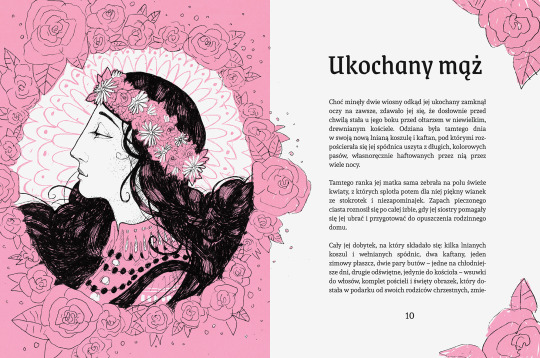
Beloved Husband
Especially for you, the entire story is translated below
[ warnings: character death, violence, progressive madness, depression, mourning ]
Although it had been two springs since her beloved closed his eyes forever, it seemed to her that just a moment ago she was standing at his side in front of the altar in a small wooden church. She was clad that day in her new linen chemise and kaftan, under which stretched her skirt sewn from long, colourful strips, embroidered by her own hands over many nights.
That morning, her mother herself had collected fresh flowers in the field, from which she later wove a beautiful garland of daisies and forget-me-nots for her. The smell of baking cake spread throughout the room as her sisters helped her dress and prepare to leave her family home.
All her belongings, which consisted of several linen shirts and woollen skirts, two kaftans, one winter coat, two pairs of shoes − one for colder days, the other festive, only for church − hair pins, a set of bedding and a holy picture she had received as a gift from her godparents, fit easily into a small wooden chest decorated with painterly ornaments.
Her beloved was beautiful, joyful and kind, his lips curving into a lazy smile at the sight of her, for he had loved her ever since she could remember. He called out to her when she returned from the fair, when she left church with her parents, he made her laugh by looking at her over the fence as she fed her geese, by telling her made-up tales and legends.
He would come to her parents with gifts, wishing them to look upon him with a more favourable eye, as he was poorer than they were − she was the daughter of a respectable farmer, while he was the son of a simple serf peasant apprenticed to a blacksmith.
Although her guardians at first regarded him with disapproval and reserve, they eventually recognised his industriousness, which also brought him a tangible income. He spent days and nights in the forge, creating things that were not only useful and durable, but also beautiful, appreciated by the villagers and the heirs of the manor houses.
Without delay, he came to the aid of his future parents-in-law when the hinges of their doors and shutters began to loosen and fall off. He forged new ones for them, beautifully fitted, with indentations and swirls, which they later showed off to their neighbours. She watched it all from afar, daring to offer him only her warm, happy smile and a gratitude that filled his heart with fervent hope.
− Wait for me, pretty dove. − He called out to her then, and she laughed, not even thinking of marrying another.
His approach full of patience and understanding eventually won the hearts of her parents. Her father decided, after some thought, that it was good to have such a swift, hard-working son-in-law, who, in addition, was cordial to the women.
He believed that he would certainly be a good and gentle husband, who would not hit or shout at his daughter, and who would also gladly drink vodka with his father-in-law, and would conduct a conversation well, as his mind was sharp and enlightened.
She knew that she had caught God by the feet when they finally agreed to give him her hand, and she did not hide her joy. She thanked her Lord during every evening prayer for the fact that she did not have to marry a drunkard, a scoundrel, but a kind, handsome, hard-working young man, at the sight of whom she felt warmth melt through her heart.
Not even one spring of their marital happiness had passed when her beloved fainted, having returned from the forge all hot and fiery. He coughed terribly and babbled, only making it home with the help of their neighbour. They laid him on the bed together, wondering what to do. Fear then overtook her and she immediately sent for an herbalist who lived a few huts away.
The woman arrived in the evening and, without saying anything or demanding payment, prepared water over the cooker by throwing dried leaves and herbs into it, muttering something at the same time. After these mysterious procedures, she gave her decoction to her husband, ordering him to drink.
She rejoiced, for the colours returned to his countenance, for life returned to his members, for he recognised her, calling her his pretty dove.
Her heart was filled anew with hope. Lying by his side at night, she prayed fervently, thanking God for his grace.
Only in the morning, when the first rays of the sun woke her up, wanting to attend to her daily chores and prepare his morning meal, did she feel that the body lying next to her was cold and stiff.
She was afraid to look at him, and when she finally did, she saw his face, pale and blue, his lips parted slightly, as if he were in fact still asleep. She tried to wake him, at first with a whisper, then with cries and wails, clamping her fingers over his body, but his eyelids never opened again.
She couldn't name what was happening to her. It seemed to her as if her speech had been completely taken away. Her body was left without strength, her mind became blank, dulled. She lay next to him, looking at his face, holding his cold hand in hers, unable to let go of the thought that the only thing left of him was his body.
She didn't understand what her mother was saying, stroking her cheeks and shoulders as they stood over his grave on the day of his funeral. She stared at the simple wooden cross stuck into the fresh, damp earth, listening to the women wailing and crying raucously around the coffin, chanting mournful hymns that only increased her despondency.
It seemed to her that her mind was foggy and sluggish. She drank, she ate, she did her chores, but she did not feel or experience anything. Her body was as if in a state of prolonged shock. In her mind there was still the conviction that her husband would cross the threshold of their home as he did every evening, that he would take her in his arms, speaking of his longing, that they would sit down to supper together, recounting what the day had brought them.
Her parents, seeing the impact of her bereavement and such a sudden loss, ordered her to return to the family home, which she did. From then on, she helped them with their daily chores, as she had done when she was still a maiden.
She would speak to them and be in their company, but her mind seemed to be out of her body, the emptiness that filled her began to be slowly replaced by a progressive rage and irritation, as she noticed that everyone had begun to forget about him. They laughed and smiled, got drunk and danced as he lay there, deep underground, alone.
Shrill thoughts flashed through her head as she lay alone at night under her quilt. Her heart squeezed with pain at the notion that perhaps the gravedigger had not buried him deep enough and his body would be desecrated by wolves or stray dogs or, God forbid, her poor beloved would wake up in his wooden grave and be unable to get out, driving his nails helplessly into the wooden lid.
She would cry aloud then, burying her face in her hands, holding her thoughts and pains deep inside her, feeling that no one else would understand her suffering, that only he, her dearest, if he were still alive, could comfort her.
It was then that she heard him for the first time since the day he closed his eyes forever: the loud, clear rustling of the grass and the quiet cracking of the branches beneath his feet.
She rose quickly, feeling the aggressive, chest-shattering pounding of her heart. A cold sweat ran down her back as she leaned out uncertainly to look out of the window.
There was no one in the courtyard.
She sat still for a moment, feeling a tightness in her throat at the thought that there was a graveyard beyond the woods overlooking her small room.
The next day she lay down to sleep faster than usual, excusing herself to her family for being unwell, feeling a pleasant tingling in her fingers and excitement at the thought that perhaps her beloved would visit her again, give her some sign, tell her what he needed. No one came, however, and salty tears of regret and disappointment ran down her cheeks as she lay, facing the window, watching the first rays of the sun.
She wandered off to the cemetery in the morning, explaining to her relatives that she wished to place fresh flowers on her late husband's grave. However, when she arrived at the site, she found to her disbelief and dismay that although grass should have grown on the grave long ago, the sand on it was still wet and fresh, as if he had been buried only the day before.
Walking back home along the dirt road, wrapping herself in a warm woollen shawl, she thought of her grandmother's stories. Of how people who had died, called wraiths, rose from their graves to haunt their families, peering down on their children and placing cold, corpse-like kisses on the lips of their wives and husbands.
At this thought she felt heat in her lower abdomen, a pleasant tickling sensation engulfed her fingertips and lips, and she imagined that her beloved had come to her then, that night, wanting to prove to her that he remembered her, that he loved her and could not leave without her.
The realisation that he could wander still in the world without knowing a holy rest both frightened and delighted her at the same time, that their love could be stronger than death, that his desire to stay with her was more important to him than the will of God himself, who had called him to join him.
She stopped and trembled as she heard a loud rustling in the depths of a field filled all around with tall, golden wheat. She lifted herself up on tiptoe, feeling the rumbling of her yearning heart, looking around carefully. Her breathing became raspy and loud, full of excitement.
− My love? − She heard her own trembling, warm voice, sounding as if a mother was calling her child, wanting to give him courage.
However, she saw nothing, nor did she hear any reply.
Nevertheless, the conviction that her husband was still prowling the earth and watching her was growing stronger within her. Candles would suddenly burn out in the rooms she was in, although no one passed by them, doors would open with a loud creak of old wood even though no one was standing behind them. She was awakened at night by a quiet tapping on the windowpanes that kept her awake. She had the impression that she heard someone's footsteps even when there was no one in the room but her.
She whispered to him each time, asking him to appear to her. She would convince him that his cadaverous, pale face would certainly not scare her away, that he still remained her beloved, her only one.
He did not answer.
It seemed to her that she was slowly losing her mind. She was getting thinner and thinner, her face becoming pale, bruises from dozens of sleepless nights surrounding her lifeless eyes. Her parents, worried about her behaviour and the fact that the slightest sound or movement made her flinch as she looked around the rooms, suggested that perhaps it was time to find her a new husband.
− You will have your children, and he too will comfort you with a kind word and a strong embrace of his arms. − Her mother said. She looked at her dully, feeling that her pale lips trembled parted in disbelief. Cold sweat trickled down her neck, her fingers clenched tightly on the material of her skirt.

That night, she cried aloud with her face pressed into her pillow, calling for her beloved, her kindest, cursing him and begging him to relieve her suffering, to prevent her from being given away to any other man, because they had promised each other that they would be together, now and for eternity.
It was then that she heard him again − the quiet crackling and rustling outside her window, someone's footsteps so clear that her heart leapt into her throat. She pulled herself up from her bed and looked out of the window, pressing her palms against the glass. A pitiful, low sob escaped from her throat as she spotted a male figure disappearing deep into the dark woods.
She got up quickly, putting a warm blanket over herself, and slipped out of her family home in only her nightgown, moving after the mysterious silhouette, wanting to shout for him to stop, fearing, however, that she would startle him. Seeing only the full moon and stars above her, she trudged through the tall shrubs, the needles of the pines and the sharp stones beneath her feet hurting her skin.
She knew that in order to reach the cemetery she had to walk straight ahead, and despite her fear, her heart was filled with courage, because for him, for her beloved, she was willing to do anything.
A loud sigh of relief left her lungs when she finally stood at the border of the forest, seeing clearly the outlines of wooden and iron crosses. She froze completely when she noticed a male figure leaning deeply into one of the grave pits. A broad smile appeared on her face for the first time since fate had separated them.
− My beloved! − She shouted with joy, with hope, with relief, drenched in tears, running towards him with confidence, thinking only of throwing herself into his arms again, of speaking to him again, of hearing his voice again.
My pretty dove.
She stopped halfway, feeling her heart freeze, shivers ran along her spine as the man she was running towards jumped out of the pit like a burned man.
She saw his terrified eyes, he was panting heavily as if he was some wild animal, raising his hands high in the air. She found to her horror that she did not recognise either his face or his figure, looking at him in the moonlight. He was older and taller than her husband, dressed in dark, dirty trousers and coat, his large hands black from the ground.
Only after a moment did she notice a long shovel lying next to his feet, a sack lay immediately next to it, she swallowed with difficulty recognising in its contents something that resembled shimmering gold jewellery in the moonlight.
The stranger moved suddenly towards her, grabbing earlier a shovel lying on the ground. She screamed loudly, throwing herself into flight, understanding her mistake, her stupidity, her naivety. She stumbled several times over tombstones and tree roots, her sore feet seeming to scream with every step she took.
Her voice stuck in her throat when suddenly something dull and hard hit her heavily on the back of her head, then again and again; she fell to the ground, panting heavily. Everything around her seemed to spin, she no longer recognised shapes or where she was, warm liquid ran down her forehead, the metallic taste of blood that had flooded her face melted between her lips.
She wanted to scream for rescue to her beloved, to her parents, but she was unable to get the words out. She cried out loudly and drew in a loud breath, bursting out crying when she felt his large, rough hands clamp down on her bare calves, pulling her back on the ground. Her fingers impulsively dug into the sand and grass, fruitlessly trying to resist him, something akin to a grunt escaped her throat.
My God, have mercy.
She was already completely limp when he threw her into the middle of the grave. No sound left her lips as the heavy, cold sand began to fall on her body. Her empty gaze, from which the life was slowly escaping, was fixed on the bright moon disc spreading over her head.
Before the last breath left her lungs, a thought flashed through her dying mind, from which she smiled gratefully at the stranger who stood high above her like death itself.
I will see him again.
_____
Illustrations and text are created by me. Do not repost.
#slavic mythology#slavic folklore#slavic culture#poland culture#polish folklore#slavic fanfiction#slavic tale#slavic legends#slavic fanfic#slavic demonology#slavic#slavic book#polish art#polish illustration#slavic illustration#fanfiction#fanfic#illustration#legends#tales#my tales#folklore#polish folk costume#polish tumblr#polish literature#polish culture#polish language#slavic literature#slavic art#demons
41 notes
·
View notes
Text

Death
Slavic Legends Tarot
#slavic folklore#slavic gods#tarot#death#marzanna#morana#winter#spring#bubug#slavic legends tarot#slavic legends#tarot death card
187 notes
·
View notes
Text





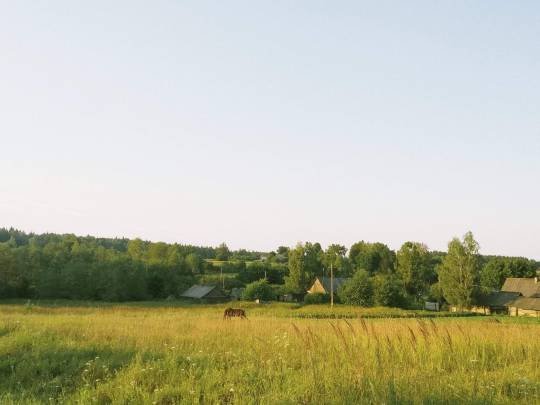

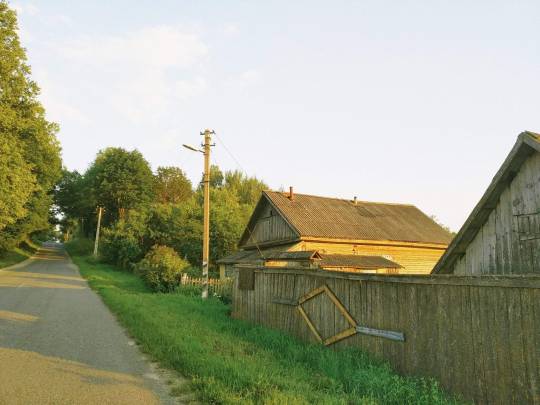
On the way to Bagrinovsky castle // part 1.
These are photos from my trip to the Belarusian village of Bagrinovo. According to an old legend, a certain, very wealthy pan long ago, running away from the advance of enemy troops, dug a tunnel from his castle directly to the ancient town of Drutsk, which was about ten kilometers away. And the castle of this pan, according to legend, was located in Bagrinovo. This historical «fact» is so ingrained in the minds of local residents that even young people still call the big quarry opposite Bagrinovsky cemetery a «castle». On the «castle», for example, you can always find noble mushrooms, also on the «castle» cheerful companies like to gather with guitars around the campfire, hiding in the «castle walls» from the reproachful gaze of fellow villagers.
In addition to the tunnel, pan distinguished himself in the memory of local villagers by the fact that before leaving his land, he hid seven golden statues in the ground, which still interest the minds of treasure seekers and adventurers. One day, armed with a metal detector, a team consisting of residents of the village of Bagrinovo and the neighboring village of Volkovichi went in search of the treasure. Between Bagrinovo and the present agro-town of Drutsk near the village of Reuchye, they found an abandoned and almost collapsed chapel. It was interesting not only her age, but also her remote position from the human eye and underground passages that went deep underground. Unfortunately, due to the location of the ruins and the lack of special equipment, it was not possible to explore these passages.
#summer#august#summer wanderings#village legends#history of villages#villages#countryside#hamlet#country#summer landscapes#summer photography#summer aesthetic#greenery#aesthetic#aesthetic of villages#slavic legends#village houses#naturecore#nature aesthetic#nature photography#rural life#rural aesthetic#cottagecore#cottagecore aesthetic#summer cottagecore#summer evenings
34 notes
·
View notes
Link
“My house has chicken legs. Two or three times a year without warning it stands up in the middle of the night and walks away from where we’ve been living.”
Published in 2018, Sophie Anderson’s 'The House with Chicken Legs' reached swift popularity. It was shortlisted for five different awards in 2019, including CILIP Carnegie Medal and the Blue Peter Book Awards. The children’s book tells the enchanting story of a young girl named Marinka, who lives with her grandmother and Jack, a jackdaw that she raised from a chick. The three of them live in the woods in their house which, as the title suggests, has chicken legs. If this is starting to sound familiar, it should – the book is an enchanting retelling of a figure from Slavic folklore, the dreaded Baba Yaga.
In Sophie Anderson’s retelling, you meet many Baba Yaga throughout the novel, the first of course, being Marinka’s grandmother. The Yaga’s job is to guide the spirits of the dead to the afterlife, through a door in each of their chicken-legged houses. Marinka herself is a Yaga in training, though as a child her only duties are to prepare food for the spirit’s last meal and fix the bone fence that marks the perimeter of the property.
Keep Reading
#Mythos#Mythology#Myths and Legends#Mythos Reviews#Book Reviews#Fantasy Books#Sophie Andersen#The House with Chicken Legs#Baba Yaga#Slavic Mythology#Slavic Legends#Witches#Folklore#Children's Books#Book Recs
5 notes
·
View notes
Text
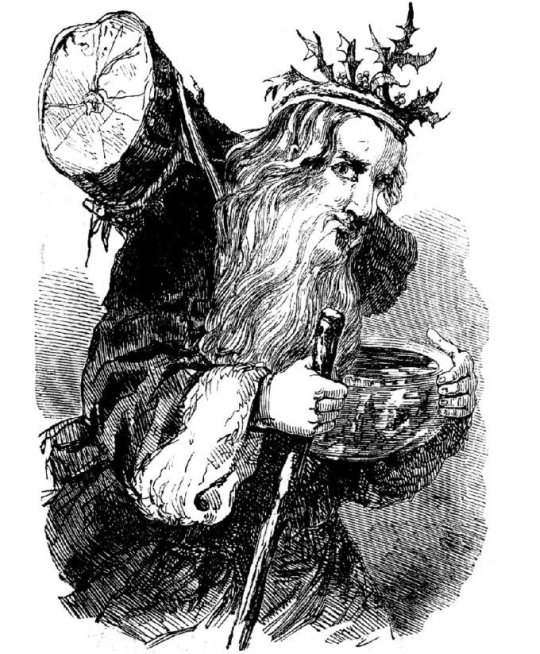
Father or Prince Christmas, carrying the Yule log, illustration from 1848. The personification of Christmas was part of the centuries-old European folkloric tradition of pre-Christian midwinter celebrations, associated with the Slavic god of the Sun and fire, as well as with counterparts in other religions, and with the burning of an oak log or sapling on each hearth to restore strength to the Sun and enter the period of its rise and the lengthening of the day. From 1780: “Here comes I, old Father Christmas, welcome or welcome not, I hope that old Father Christmas will never be forgot…”
#slavic mythology#mythology#classical mythology#folklore#slavic folklore#mythology and folklore#folk traditions#slavic culture#ancient wisdom#slavic mythology net#SlavicMythologyNet#mythical creatures#mythological creatures#mythical beings#mythological creature#fantasy creature#slavic tradition#slavic myths#myths and legends#slavic fantasy#legendary creature
61 notes
·
View notes
Text

42 notes
·
View notes
Text
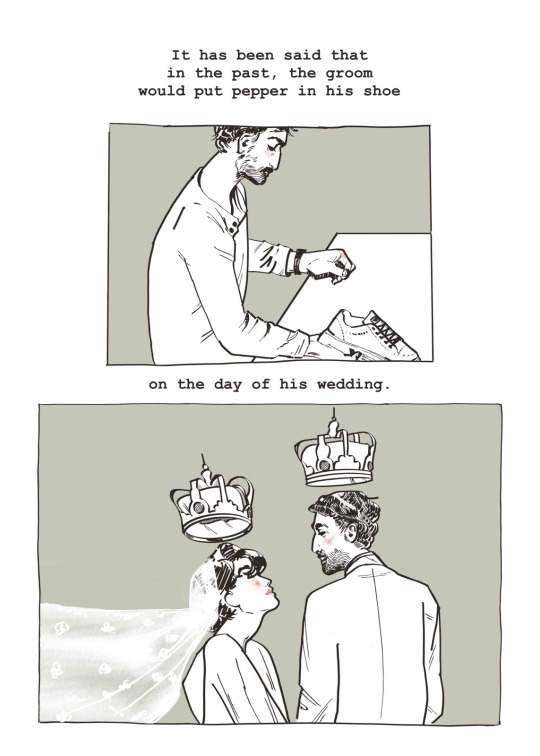
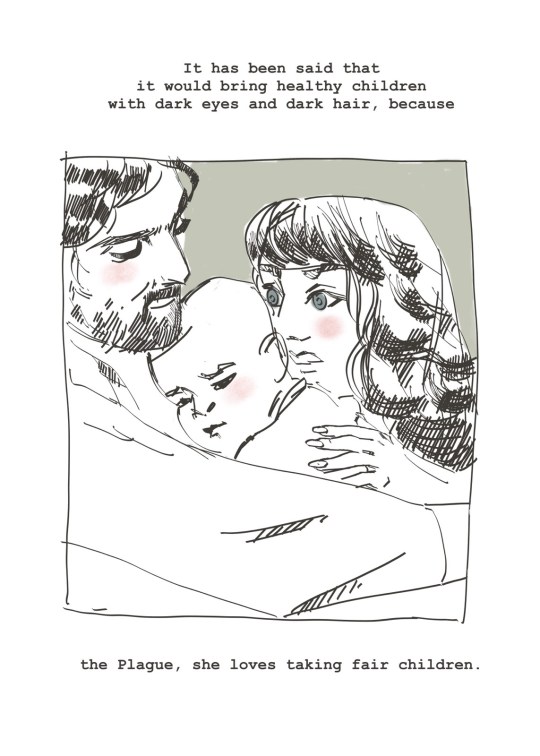

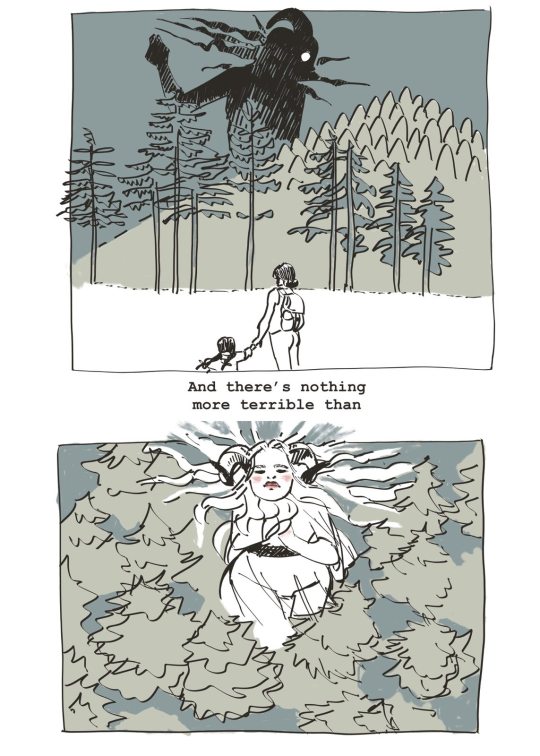
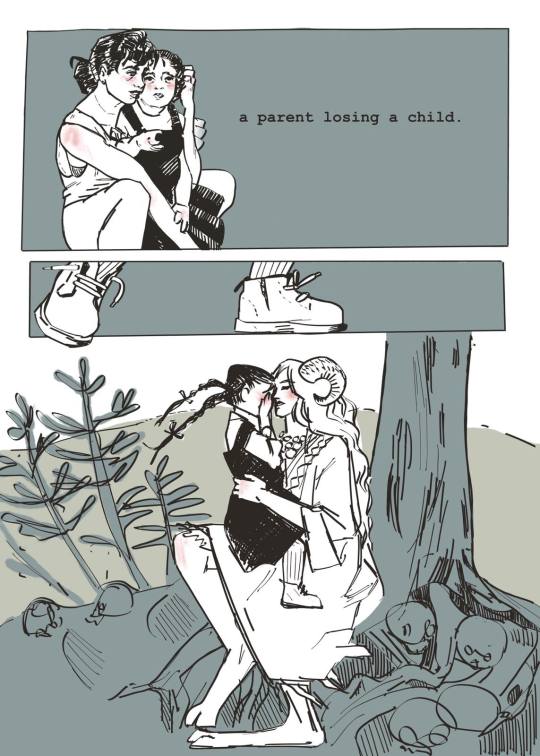
Kuga-Kuma.
There were many ways the Plague was personified in Slavic mythology. An old woman, a young woman. But she was seen as a fairy like creature from the woods who brought justified death when people would become too heavy for the Earth. She wasn’t burdened by morality of the dying just the number. But the situation wasn't always dire, there was a way to save a sick child. When a child gets sick, a fresh new outfit would be made and the child would be presented by one or two women for the Plague to except them as their godchild. If she would do so, she’d be bound by this new role to be a godmother instead, protect and spare and save the child's life.
#slavic mythology#slavic folklore#fairy tales#fairies#balkan#mini comic#myths#vila#folklore#folk legend#lore#artists on tumblr
242 notes
·
View notes
Text
i think david has the best scary stories. because he grew up in poland and has heard of like a hundred different slavic spirits and monsters and now he carries the legacy on because whenever he wants to persuade les by scaring him a little he says "eat the whole dinner or bebok will steal you" or "you can't go to the forest alone leszy will eat you" or "don't swim in the hudson river utopce will drown you and turn you into one of them." and also sometimes when he's at the lodging house for the night the littles just ask him for a scary story and he always provides (<- great narrator/storyteller david bonus)
#this is self projecting (as always)#because i remember my dad's old as fuck fairytale books with scary drawings of monsters#david goes above and beyond to entertain the littles with the legends he remembers and stories he improvises using existing slavic folklore#and on that aspect the littles love him even more than they love jack#and i will die on that hill#newsies#newsies 1992#92sies#david jacobs#newsies david jacobs
93 notes
·
View notes
Photo

Legends and myths about trees
Legendary tree deities (20)
Leshy – ‘Forest guardian’, the lord of the forests
The Leshy is a tutelary deity of the forests in pagan Slavic mythology. He is the spirit who rules the forest and the hunt, and the master of the forest animals.
Leshy had well developed polymorphic skills. Mostly, he was appearing as an anthropoid creature, old man with a beard, sometimes a one eyed cyclops. He could change his sizes due to the height of the forest. Moreover, he could take the form of animals such as wolf, bear, eagle-owl, or even transform into wind. Leshy’s helpers were various small demons, ghosts and forest imps, such as auk (the ghost of echo), puszczewik, Mochowiks, (guardians of mosses) Lugowoj and Polewoj. There were also caring creatures, for example grybicz (mushrooms), jagodynicz (blueberries), pczelicz (bees), whose names clearly show what kinds of forest “inhabitants” they were taking care of.
Towards people, his behaviour was changing, from neutral to hostile. It depended mostly on how people treated the forest and its creatures. Leshy was especially unfriendly to hunters and lumberjacks, who were clearly violating his inhabited lands. Depending on his attitude, he could either misguide people, or help them to find a way out from the forest, play pranks by, such as scattering forest undergrowth from the basket, or protect them from wild animals attacks. Formerly, the place, where Leshy’s presence, or signs of his activity, were observed, was considered as a sanctuary. It was forbidden to come in to that part of the forest, but more importantly, to cause damage such as cutting down trees, hunt, or collect fruits of the undergrowth like nature reserves.
If you are walking through a deep, overgrown forest and feel someone looking at you or following you, it could be a Lshey. If you turn around to look at him, you cannot see him as he’s much quicker than you.
He may try to misorientates travellers entering the forest and lure them deeper into the forest, but if they wear their shoes backwards and their clothes backwards and forwards, the Laceys will be confused and their magic will be easily broken.
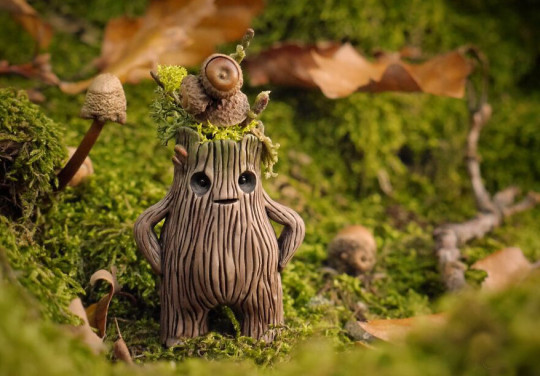
木にまつわる伝説・神話
伝説の樹木の神々 (20)
レーシー 〜「森の番人」、森の主
レーシーは、異教徒のスラブ神話の森の守護神である。彼は森と狩りを支配する精霊であり、森の動物たちの主でもある。
真っ白な頭髪と長い髭を持ち、足まで届く頭髪と髭で体が隠れている。 森の中では樹木と同じように大きくなり、森の外では木の葉に隠れられるほど小さくなるともいわれる。
レーシーはよく発達した多形能力を持っていた。最も一般的なのは、人間型生物、髭を生やした老人、時には一つ目のサイクロプス、不自然なほど白い顔の人間として現れることである。また、森の高さによって大きさを変えることができる。さらに、狼や熊、鷲のような動物の姿になったり、風に変身したりすることもある。レーシーの助っ人は、アウク (木霊)、プシュチェヴィク、モホヴィク、ルゴウォジュ(苔の守護者)、ポレウォジュなど、さまざまな小悪魔や幽霊、森の妖怪たちである。また、グリビッチ (キノコ)、ヤゴディニッチ (ブルーベリー)、プツェリッチ (ミツバチ)など、世話好きな生き物もいた。その名前は、彼がどんな森の「住人」の世話をしていたかを明確に示している。
人間に対しては、人々が森とその生き物をどのように扱うかに大きく左右された。特に、ハンターや木こりなど、明らかに自分の生態系を侵害するものに対しては、レーシーは非友好的であった。彼の出方次第で、人を迷わせたり、森からの脱出を手助けしたり、バスケットから森の下草を撒くなどのイタズラをしたり、野生動物の攻撃から守ったりすることができる。��前は、レーシーの存在や活動の痕跡が確認された場所は、聖域とされていた。自然保護区のように、その場所に立ち入ることはもちろん、木を切り倒すなどの被害を与えること、狩りをすること、下草の実を採取することも禁じられていた。
深く生い茂った森の中を歩いているとき、誰かの視線を感じたり後をつけられている感じがすれば、それがレーシーである可能性がある。 姿を見ようとして振り向いても彼の方が素早いので姿を見ることはできない。
森に入る旅人の方向感覚を狂わせ、森の奥に誘い込もうとすることもあるが、靴を逆に履いたり、服を前後逆に着たりすると、レーシーは混乱し、魔法は簡単に解けてしまう。
#trees#tree legend#tree myth#slavic mythology#leshy#forest guardin#master of wildlife#polymorphic skills#magical spirit#forest spirit#legend#mythology#folklore#mushroom#blueberry#bee#nature#art#forest#paganism
144 notes
·
View notes
Text
Personally I find it really funny that based on what the twins said in the Book 2 finale re: having to tell their mom about what happened to Unalaq, it's literally canon that Unalaq's wife a) exists, b) is alive, and c) is just chilling in the Northern Water Tribe
She took one look at all the spirit fuckery her husband was getting up to and went "Well that's none of my business" and honestly I respect that
#oh and when I say spirit fuckery I mean it in both the literal and metaphorical sense. blame kat's latest raava and vaatu fic#yeah I'm just gonna start posting random LoK opinions on here now. this blog's been dead long enough#not really an incorrect quotes girly anymore sorry#not even a girl anymore. but you know#most of my red lotus and oc posting will remain on my personal blog though bc no one wants to see that#anyway. yes. Unalaq's wife. when I say the avatar franchise has a mom problem this is exactly what I mean#80% of characters don't have a mom. the moms that are alive either have little to no screen time or mentions#or they're basically Schroedinger's mom in the sense that they exist but not really#the exceptions being like. pema and suyin. and maybe senna though she also has very little screentime#my point is. the twins are younger than korra. I know avatarverse has a precedent for putting kids on the throne. looking at you zuko#but really we should have gotten unalaq's wife as chief of the nwt#introduced her in book 3 during the lead up to p'li's prison break#but that's just my objectively correct opinion#northern water tribe chief raspberry when#(according to avatar wiki her name is malina so I've been calling her raspberry in my head ever since I found out#malina means raspberry in russian that's why. probably in a bunch of other slavic languages too idk I'm not an expert#and she shares a name with katara and sokka's weird white stepmom from the comics which no sane person considers canon. so that's fun)#the legend of korra#unalaq
34 notes
·
View notes
Text
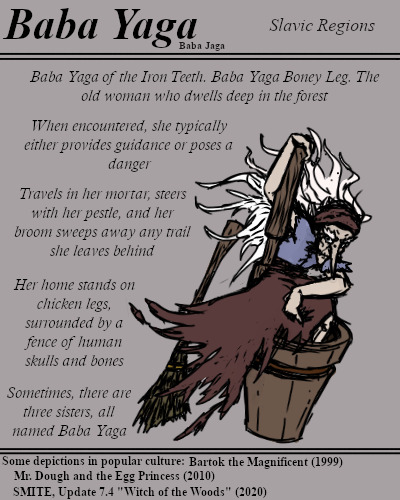
The iron-toothed crone with a leg of bone that dwells deep in the woods, Baba Yaga is said to steal and eat young children.
#BriefBestiary#bestiary#digital art#fantasy#folklore#legend#myth#mythology#fairy tale#baba yaga#baba jaga#baba yaga of the iron teeth#baba yaga bony leg#witch#slavic folklore#slavic fairy tale#crone#hag
111 notes
·
View notes
Text
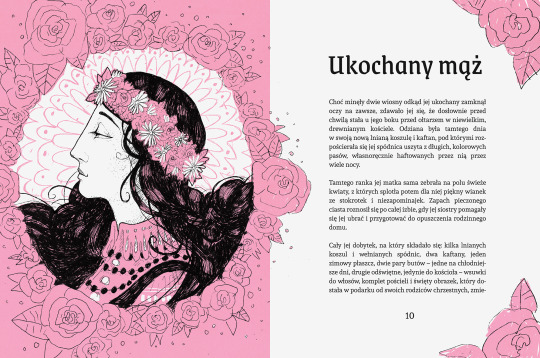
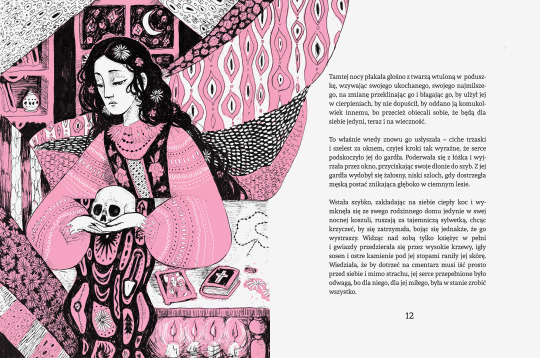

Completed illustrations to my mini-story Beloved Husband. These will be part of my new book about polish folklor and demonology.
14 notes
·
View notes
Text

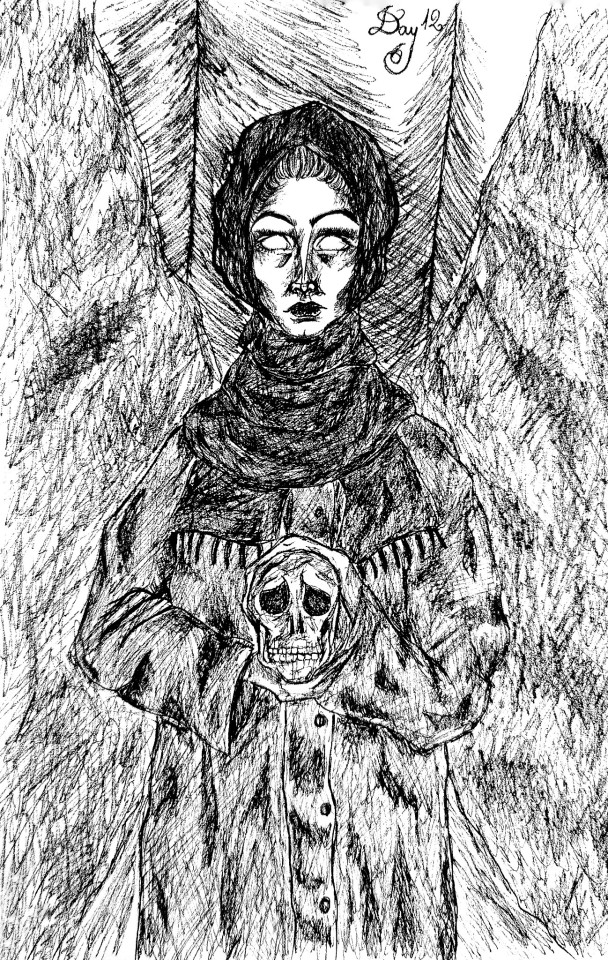
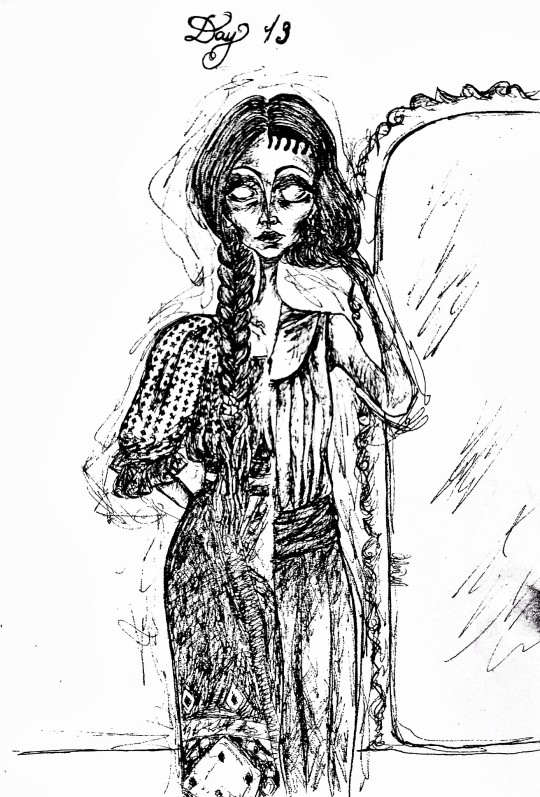

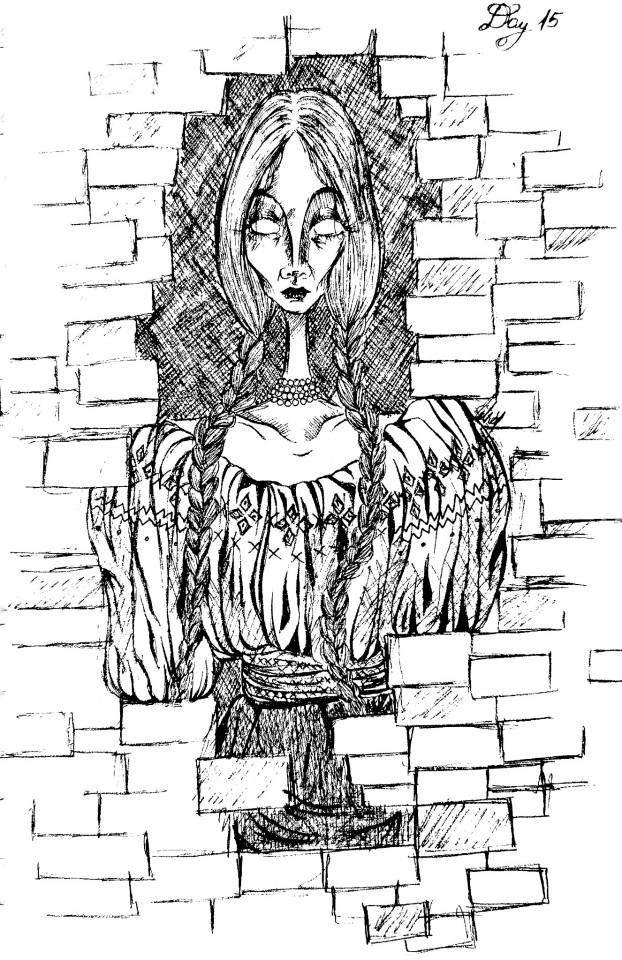

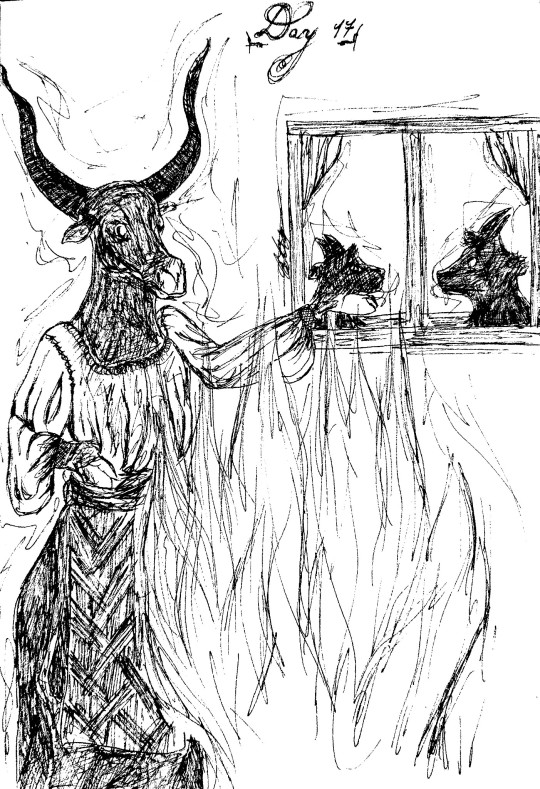
Days 11-17 tales and legends
Day 11 - Miorița [legend according to which a shepherd is murdered by the other two, although warned by one of his sheep]
Day 12 - Baltagul [written by Mihail Sadoveanu, published in 1930 portrays how he pictured the events after the legend of Miorița, where the shepherd's wife goes look for her husband, later seeking justice after he's found dead]
Dya 13 - Ciuleandra [scenes from the 1985 movie, made after the 1927 book with the same name, depicting the evolution of a man's madness, also being presented the life and death of a girl taken away from a village be the owner of the land as he found her suitable for his son, destroying the peasant, Mădălina, having her turned into a lady of society, now Madeleine, that ends up murdered by the son]
Day 14 - Moromeții [depicted in the illustration is the scene when the tree is cut down, resulting in the loss of equilibrium in the characters' lives, as actions takes place through the establishment of the communist regime, which contributes to the family's financial struggles, as presented by Marin Preda in the book from 1955, turned into a movie in 1987]
Day 15 - Ana lui Manole [the man hired to build the most beautiful monastery faces difficulties as the building kept collapsing every night despite working with the best constructors, but after a dream that told him to put his wife within a wall so that the place ceases to go down, so he then proceeds to build his pregnant wife Ana inside the wall, succeeding to keep the place standing <they're later forced to fly off the rooftop, each falling to their death>]
Day 16 - Harap-Alb [after the main character gets beheaded by the villain, it is the Emperor's daughter that sews his head back on, bringing him back to life]
Day 17 - Capra cu Trei Iezi [the mother goat sets a trap for the wolf to fall into a pit of fire as revenge for having killed her sons and placing their hears in the window, leaving her only with her youngest son]
#romanisme#romania#romanian legends#tales#Miorița#Baltagul#Mihail Sadoveanu#Ciuleandra#Liviu Rebreanu#Moromeții#Marin Preda#Mănăstirea Curtea de Argeș#Ana lui Manole#Harap-Alb#Ion Creangă#capra cu trei Iezi#inktober#folktober#slavic folklore#romanian folklore#sketchbook#ink illustration#romanian blouse#ie#romanian artist#folktobrie
51 notes
·
View notes
Text
Viktor x Reader where the Reader is also slavic but hasn't been separated from their culture compared to what became of Viktor. At the end of his battle against Jayce, the Machine Herald is found by Reader and their people who were visiting Pilltover before the events of the second season occurred (I can only guess what will happen in the second season of the show. In LoL lore we trust).
Viktor wakes up in an unfamiliar place. Yes he shares the accent with Reader and their people but he does not understand their language. Reader would need to teach him it but the most he can do is speak a very broken form of it. He'd be able to read the simple words and although he's very smart and unsurprisingly keen to learn, he does not enjoy how long learning a language takes or how often he messes up. Or how the Reader teases him every single time. Well, he might enjoy it.
The air is clean, different from what Zaun was like. The homes were smaller and less grand to what Pilltover was. Smaller than what other kingdoms had to offer. It was a village much more tribe-like than what the rest of the world has grown to be, a fair distance from its capitol and its muscovite style architecture. It was rural. It was home.
#viktor x reader#arcane x reader#arcane viktor#league of legends#I'll say it#I prefer his general slavic accent to the thick russian one in the game#I get to relate to it now#plus I love hearing him talk#Harry Lloyd did a very good job#only thing I'll be adding when writing Viktor is making him *more* slavic by removing “the” and “a” from his vocab#anyways#chronically ill slav? me too
31 notes
·
View notes
Text
∗❀𓇣❁introducing you the south bohemian culture❁𓇣❀∗
ok so since noone really cares about south bohemian culture anymore, i'll to try to embrace it here on my blog, at least so that people know it exists. for the ones who don't know, Bohemia is an area in Czechia, that takes up most of the country. in czech, it is called 'Čechy'. now, you might notice the similarity between the words chechia and čechy - yes, my whole country is called after this part of it, even though it contains three regions: Bohemia (Čechy), Moravia (Morava) and Silesia (Slezsko). moravians and silesians take care of their culture pretty well in these trying times, but the bohemians, being the most influenced by the west culture, usually don't. so here's me, the tiniest person on tumblr, trying to do something about it! yay!!
❀first i'd like to say something about the name of this entire region. so according to an old, veery old myth, at first, all the slavic tribes lived in one place, 'v matičce Rusi' (in the mother of all, Russia). But the tribes and families started to lack space for their houses, animals and children, and thus two brothers, Čech and Lech, decided to go search for a new place for them. they went a long, long way, until they came to today's czechia, specifically to the mountain Říp (it actually exists). the forefather Čech climbed on the top of it, he looked around and saw, that they came in their promised land. it had beautiful mountains on the sides and fertile meadows in the middle, miles and miles of dark woods, and it was rich in milk and honey. and when he asked what it should be called, the slavs shouted in excitement that it should be called after the forefather himself. (i love this story a lot<3)
❀next post is going to be about the south bohemian region itself and it's parts! i'm planning on still posting art on this blog, but making it more representing of my slavic culture. i hope someone finds this interesting!
also sorry if i made any english mistakes :)
#slavic#rumour#old story#old rumour#slavic legend#slavic culture#čumblr#czechia#czech culture#bohemia#bohemian culture#south bohemia#obrozujeme#slavic representation#culture#history#slavic history#czech history#czech legend
61 notes
·
View notes
Text

Vila is the Slavic equivalent of a fairy, usually human-sized. Vile (plural) are always beautiful, eternally young women, with long hair in which lies all their magical power. These enchanting beings of nature can often fly and sometimes enter into brief relations with mortals, who are unable to hold onto them for long.
Stay tuned to read more intriguing bits of Slavic mythology in English (and many other languages soon on our website). 🔥
#slavic mythology#mythology#classical mythology#folklore#slavic folklore#mythology and folklore#folk traditions#slavic culture#ancient wisdom#slavic mythology net#SlavicMythologyNet#mythical creatures#mythological creatures#mythical beings#mythological creature#fantasy creature#slavic tradition#slavic myths#myths and legends#slavic fantasy#legendary creature
74 notes
·
View notes